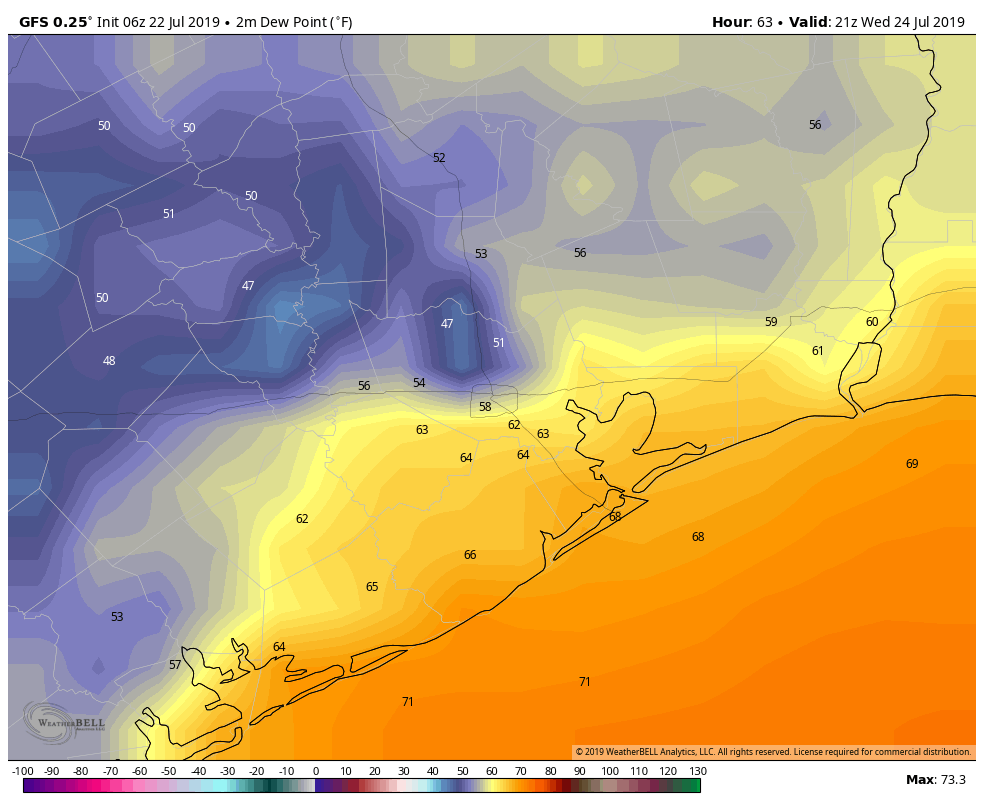Houston’s weather pattern will turn more interesting this week, and not in a bad way as a bonafide cold front moves into the region. This won’t be a prototypical fall front, there’s just not enough cold air available to work with, but it will be noticeable as some significantly drier air moves in. Areas on the inland side of Interstate 69, especially, may see dewpoints in the low- to mid-50s later this week. This will offer a rare, if short-lived reprieve from the kind of humidity we’re normally accustomed to during the summer months in Houston.
If dewpoints are an unfamiliar concept, they offer an indicator of total moisture in the air. The past several mornings, when you’ve walked outside and been smacked in the face by high humidity, the dewpoint has generally been in the mid-70s for Houston. That’s typical for July. Anything from 60 or lower will be completely noticeable, especially during the evening and morning hours. Roughly, for Houston, here’s what various dewpoints mean:
- 70s means uncomfortable, or typical summer
- 60s means humid, but not terrible
- 50s means mostly comfortable
- 40s or less means very comfortable or dry
Monday
Today will be a lot like Sunday, with partly to mostly cloudy skies, and highs in the mid-90s. There’s enough moisture that we should again see the development of showers and thunderstorms along the sea breeze that moves inland late this morning and the afternoon hours. Rain chances are probably in the 40 percent range, meaning showers will be very much hit or miss.
Tuesday
Late Monday night, or Tuesday morning, the front will push into the area. The lift associated with the front will produce a healthy chance of rain. However, the atmosphere is not uniformly moist, so rainfall is far from guaranteed for your area, especially for inland parts of metro Houston. It’s looking like accumulations will range from 0 to 0.5 inches for most of Houston, with the better accumulations likely right along the coast. Highs will be in the low 90s, and Tuesday evening should begin to show the effects of drier air as dewpoints fall into the 60s.
Wednesday
This should be a pretty incredible day for late July in Houston—normally the hottest time of the year. The day should start of with a low of around 70, with significantly lower dewpoints, and highs will probably only be about 90 degrees despite ample sunshine. Wednesday evening and the overnight should be the driest of the week, with most of Houston seeing dewpoints in the 50s, and temperatures in the 60s. Unreal.

Thursday
Sunny again, but not quite as dry in terms of dewpoints, as Wednesday.
Friday, Saturday, and Sunday
As moisture begins to flow back from the Gulf of Mexico on Friday, the low dewpoint party will be over. We’ll see some increasing rain chances due to this moisture over the weekend, with a healthy 30 to 50 percent chance of rain on both Saturday and Sunday. We’re not looking at anything too extreme in terms of accumulations.

I’ll take it, are you kidding?! Normally it’s an interrupted run from early July sometimes through mid-to-late September of, “UGHHHHHH” weather!
Maybe it would be better categorized as a “Not so stinkin’ hot front”?
As brief as it is, a 60 or less dew point works for me!
Any comments on the possible tropical wave south of Florida?
When might we see widespread rain? There’s been almost no rain in the 290/Beltway area for weeks, it has gotten close, real close. But we are bone dry. I’m having to water every evening.
Should we cover tender vegetation ?
Bring the elderly in and wrap the pets.
It’s ice hockey weather! Lay that rink and get the Hawks and Blues down here for a “Winter Classic.”
… only in Katy.
When the dew point measurement is used to estimate the air’s water content, does the measurement offer more information that a measure of relative humidity? Put simply, when talking about humidity, why state dew point rather than relative humidity?
Dew point is a better approximation of the moisture content of air since it does not depend on the air temperature, as opposed to relative humidity, which does depend on the air temperature For example, air with relative humidity of 30% with a temperature of 90 deg F would have more moisture than air with relative humidity of 90% with temperature of 40 deg F. Thus, meteorologists will typically prefer to speak of dew point rather than relative humidity since it is a better absolute measurement of the moisture in the air.
What are your thoughts on the possible system forming off the coast of Florida?